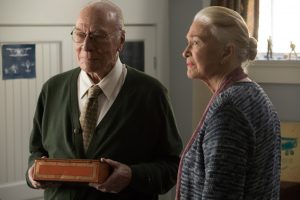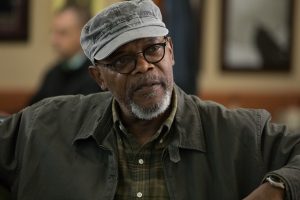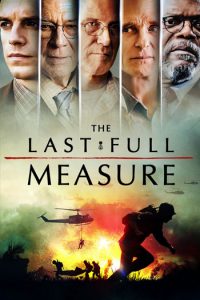“The Last Full Measure” (2020). Cast: Sebastian Stan, William Hurt, Ed Harris, Samuel L. Jackson, Christopher Plummer, Peter Fonda, Diane Ladd, Bradley Whitford, Amy Madigan, John Savage, Jeremy Irvine, Alison Sudol, Linus Roache, Dale Dye, Ser’Darius Blain, James Jagger, Zach Roerig, Ethan Russell, Cody Walker, Richard Seymour Cawthorne, LisaGay Hamilton, Asher Miles Fallica, Rachel Harker, Hannah Black. Director: Todd Robinson. Screenplay: Todd Robinson. Web site. Trailer.
An old adage maintains “Better late than never.” But is “late” truly acceptable? In many cases, it’s used as an all-too-convenient excuse for careless oversights, intentional snubs or even willful, agenda-driven and often-indefensible denunciations. It’s at that point when efforts to make up for those shortcomings often emerge, some of which slowly fall by the wayside but others of which succeed to rectify instances of “justice delayed is justice denied.” So it was for a band of zealous advocates who fought for the recognition deserved by a deceased war hero in the moving, fact-based drama, “The Last Full Measure.”
On April 11, 1966, troops from the U.S. Army’s 1st Infantry Division were ambushed while carrying out Operation Abilene, a mission that proved to be one of the deadliest campaigns of the Vietnam War. During the course of the fighting, the soldiers were surrounded and the division’s medic was injured, leaving the troops without anyone to attend to the wounded. The Air Force was called in to assist, with Pararescueman William H. “Pits” Pitsenbarger (Jeremy Irvine) volunteering to replace his Army counterpart. He was lowered from a helicopter into the middle of a firefight, where he heroically proceeded to care for 60 injured soldiers – even giving up an opportunity for his own evacuation – before being killed in action himself.
[caption id="attachment_11720" align="aligncenter" width="350"] Air Force Pararescueman William H. “Pits” Pitsenbarger (Jeremy Irvine) comes to the rescue of Army troops caught in a deadly ambush in Vietnam in 1966 when their medic is injured and unable to tend to the wounded in the engaging, heartfelt drama, “The Last Full Measure,” now available for home viewing. Photo courtesy of Lionsgate.[/caption]
Air Force Pararescueman William H. “Pits” Pitsenbarger (Jeremy Irvine) comes to the rescue of Army troops caught in a deadly ambush in Vietnam in 1966 when their medic is injured and unable to tend to the wounded in the engaging, heartfelt drama, “The Last Full Measure,” now available for home viewing. Photo courtesy of Lionsgate.[/caption]
In the wake of Pitsenbarger’s valiant efforts, he was posthumously awarded the Air Force Cross. However, his veteran colleagues and family members believed he deserved more, namely, the Medal of Honor, the military’s highest distinction. But, as the process to secure this honor played out, the request was inexplicably turned down. His supporters were mystified and launched a campaign to appeal the decision. They desperately wanted to see Pits receive his due, but, for 32 years, their efforts went for naught. Defense Department staff were repeatedly assigned to the case but with no success (most likely due to a lack of vigilant effort to see it through).
That all changed in 1998. Scott Huffman (Sebastian Stan), a young rising star in the Defense Department, was assigned to look into the request for a medal upgrade, a task he was reluctant to take on. As a Pentagon fast tracker, he was more concerned with his own career development than he was with taking on what was essentially seen as a thankless, dead end assignment (and one in which he had no prior experience at that). But, with the gentle but persistent prodding of his boss (Bradley Whitford) to at least make the semblance of an effort, he half-heartedly began an investigation into Pitsenbarger’s case.
Huffman initially met with Pitsenbarger’s staunchest advocate and fellow soldier, Tom Tulley (William Hurt). Huffman explained that medal upgrades were rare and that the likelihood of it happening in this case was slim, especially after 32 years. However, Tulley saw through Huffman’s attempts to shirk his responsibilities and guilted him into investigating further. Tulley related Pitsenbarger’s story in detail, making an impassioned plea to look into the matter for his colleague’s aging and ailing parents, Frank (Christopher Plummer) and Alice (Diane Ladd), both of whom wanted to live to see their son properly honored.
Reluctantly, Huffman traveled to Ohio to meet with Tulley and Pitsenbarger’s parents. They encouraged him to speak with several of Pits’s surviving colleagues to obtain new testimony to strengthen the case in favor of the upgrade. And so, before long, Huffman paid visits to a trio of veterans who witnessed Pitsenbarger’s heroism firsthand, Billy Takoda (Samuel L. Jackson), Jimmy Burr (Peter Fonda) and Ray Mott (Ed Harris). During these visits, Huffman learned more about Pitsenbarger’s courage under fire. He also heard their own stories, particularly with regard to the horrors they experienced and the ghosts that still haunted them.
[caption id="attachment_11721" align="aligncenter" width="350"] Pentagon staffer Scott Huffman (Sebastian Stan, left) and Army veteran Tom Tulley (William Hurt, right) seek to secure a posthumous Medal of Honor award for a fallen hero killed during a deadly ambush in Vietnam in 1966 in director Todd Robinson’s latest, “The Last Full Measure,” now available for home viewing. Photo courtesy of Lionsgate.[/caption]
Pentagon staffer Scott Huffman (Sebastian Stan, left) and Army veteran Tom Tulley (William Hurt, right) seek to secure a posthumous Medal of Honor award for a fallen hero killed during a deadly ambush in Vietnam in 1966 in director Todd Robinson’s latest, “The Last Full Measure,” now available for home viewing. Photo courtesy of Lionsgate.[/caption]
Through this experience, Huffman’s attitude slowly changed. He began to see the merits in upgrading the honor. He developed an uncharacteristic compassion for his subject. And he forged a bond with Frank and Alice, including a desire to see their wish realized. These attributes were further bolstered by a trip to Vietnam to meet with another of Pitsenbarger’s colleagues, Chauncey Kepper (John Savage), who took up residence in the embattled nation after the end of the war. Kepper, who penned a glowing recommendation for Pitsenbarger, explained that his testimony must have been lost during the 1975 Fall of Saigon, when many U.S. military records on file in Vietnam were destroyed or abandoned. Huffman learned that Kepper’s account, along with additional new revelations, could significantly help to pave the way for the fallen soldier. This heartfelt encounter also galvanized Huffman’s resolve to see things through, a radical shift in his outlook and personal character.
But, even with this new evidence, Huffman still faced huge hurdles to overcome. In the course of his investigation, he discovered that the denial of Pitsenbarger’s medal was tied to a cover-up of dirty little military secrets. And, on top of that, he also had to make an appeal to a Congressional sponsor for the request – in this case, a Senator (Dale Dye) who was involved in Operation Abilene and may have had an unwitting connection to the cover-up that prevented the awarding of Pitsenbarger’s honor, a longstanding conspiracy that Huffman later learned had been shamefully sustained by someone he had considered an ally.
Would justice be served in this case? And what would the outcome of this effort mean to Huffman and to Pitsenbarger’s family and friends? Clearly there was a lot at stake – and a lot to be gained – including for those who the hero touched but never met on the battlefield.
The inexcusable delay in recognizing the valiant behavior of William Pitsenbarger is indeed mind-boggling. The bureaucratic incompetence was bad enough, but the fact that this honor was denied for dishonorable reasons is infuriating. Thankfully, the efforts of his advocates to see this miscarriage of justice rectified is genuinely inspiring. Their belief in his selfless gallantry and their commitment to see his heroics properly recognized reflect a fervent conviction to realize this aspiration. It’s indeed one of the most commendable examples of the conscious creation process at work, the philosophy that maintains we employ the power of our thoughts, beliefs and intents in manifesting the reality we seek.
While the efforts of Pitsenbarger’s advocates may have taken some time to produce results, their ongoing commitment to the materialization of their goal is undeniable. Their faith in their beliefs to see the initiative realized demonstrates just how powerful these notions can be, even over an extended period of time and in the face of seemingly insurmountable obstacles. Such conditions can be frustrating, to be sure, but arduous circumstances need not doom our efforts. As long as we don’t lose sight of that, the possibility of success is always attainable.
[caption id="attachment_11722" align="aligncenter" width="350"] Frank Pitsenbarger (Christopher Plummer, left) and his wife, Alice (Diane Ladd, right), the ailing and aging parents of a Vietnam War hero, seek the fulfillment of a dream to see their late son posthumously granted the Medal of Honor, the military’s highest distinction, in the fact-based drama, “The Last Full Measure.” Photo courtesy of Lionsgate.[/caption]
Frank Pitsenbarger (Christopher Plummer, left) and his wife, Alice (Diane Ladd, right), the ailing and aging parents of a Vietnam War hero, seek the fulfillment of a dream to see their late son posthumously granted the Medal of Honor, the military’s highest distinction, in the fact-based drama, “The Last Full Measure.” Photo courtesy of Lionsgate.[/caption]
To fulfill an objective like this, we must be prepared to overcome our fears and live heroically. That could understandably be viewed as a daunting prospect, but Pitsenbarger’s backers had an inspiring example to draw from in overcoming this hurdle – his own battlefield behavior. When others may have turned tails and run, the intrepid airman stayed the course, remaining committed to his mission and even passing up an opportunity to evacuate for his own safety, despite the pervasive dangers. That’s significant, for, if such actions don’t inspire us to our own heroism, what will?
The fulfillment of a goal like this also calls for a willingness to surmount limitations, and, for those who fought for Pitsenbarger’s recognition, there were many to overcome. The bureaucratic maze, the lost records of his heroics, the intentional efforts to squelch the truth and the frustration of attrition alone may have been enough to discourage even those with the best of intentions. It can be exceedingly difficult to remain committed, for example, when we’re directly told that our efforts are likely to be futile, as Huffman tells Tulley in their initial meeting. However, breakthroughs of almost any kind never come about without an attempt to penetrate barriers. That may require tremendous tenacity, but, when armed with this quality, it may be possible to knock down such walls, even changing the hearts and minds of those who erect such hindrances in the first place.
Developments like these can go a long way toward encouraging such situations to evolve – and favorably so at that. One need only look at the evolution Huffman undergoes as this story plays out. It’s heartening to see how someone who began this effort disinterestedly because it impinged upon his own self-serving ends can become transformed over time. It’s a process that makes him a better man, a better husband and father to his wife (Alison Sudol) and son (Asher Miles Fallica), and, above all, a better soul to those in need of the newfound wellspring of compassion that emerges from within him. The inspiration that prompts his own transformation, in turn, enables him to return the favor for others, paying it forward so that others may benefit.
And this, by extension, beautifully illustrates the innate connectedness that we all share. Through Huffman’s efforts, we get to see how his work touches so many others, including countless people he had never met before – and even after – this experience. Like strands stretching out in all directions, the inherent linkage that binds us all becomes obvious, showing just how profoundly and effectively we’re all able to touch one another. Of course, none of that ever would have happened were it not for the initial efforts put forth by Pits himself. He may have died 32 years before he received his recognition, but his impact carried on all through that time – and beyond – affecting individuals he never met but who were touched by his presence, a stirring observation offered by Air Force Secretary Whit Peters (Linus Roache) at Pitsenbarger’s award ceremony.
[caption id="attachment_11723" align="aligncenter" width="350"] Army veteran Billy Takoda (Samuel L. Jackson) presents witness testimony to strengthen the case for a Medal of Honor award for a heroic fallen colleague in “The Last Full Measure.” Photo courtesy of Lionsgate.[/caption]
Army veteran Billy Takoda (Samuel L. Jackson) presents witness testimony to strengthen the case for a Medal of Honor award for a heroic fallen colleague in “The Last Full Measure.” Photo courtesy of Lionsgate.[/caption]
Imagine what kind of world we could have if we all held beliefs in line with such thinking. The horrors of conflicts like Vietnam could easily become a thing of the past. In fact, the effort behind such manifestations could be transmuted into something meaningful, such as the establishment of a butterfly sanctuary set up by Chauncey Kepper on the very site where Operation Abilene took place, a moving discovery Huffman makes while on his visit to Vietnam. That’s something to think about as we move forward and ask ourselves what kind of an existence we want to manifest for ourselves. Must we stay locked into outmoded conventions that no longer serve us? Or can we do better? We need not remain stuck as long as we’re willing to change our beliefs about what we seek to create.
I should note that I am generally not a huge fan of war films, but “The Last Full Measure” is a definite exception. The picture doesn’t hesitate to depict the hell that is war. And it doesn’t spare viewers the emotional fallout that its participants underwent, including the younger selves of Pitsenbarger’s colleagues (Ser’Darius Blain, James Jagger, Zach Roerig, Ethan Russell, Cody Walker) and his survivors, such as his parents and his devastated girlfriend, Jenny, who mourned his loss both in her youth (Hannah Black) and on into middle age (Rachel Harker). Yet, despite these painful images, the film also honorably recognizes the valor and generosity of those who were willing to make the ultimate sacrifice for the well-being of our fellow man. What’s more, it makes an eloquent case for considering the possibility of moving beyond conflict, to look at alternate ways for resolving our disputes. Should we succeed at that, we would be able to pay the ultimate tribute to soldiers like William Pitsenbarger for helping enlighten us to a path that need not include the barbarity they had to endure.
Sadly, “The Last Full Measure” is a movie that really got the shaft: Between being released in theaters in the cinematic wasteland that is typical of January (instead of the genuinely more fitting year-end awards season window) and a barrage of smarmy negative reviews by ever-so-cynical critics who are probably too young to remember the horrors of Vietnam (if they were even born during that time), this moving, heartfelt, fact-based story earns every bit of respect and emotion that it brings out of its viewers. With an excellent ensemble cast featuring superb performances by William Hurt, Samuel L. Jackson, Ed Harris, Christopher Plummer and Peter Fonda (in his final performance), this stirring tale tells a compelling, no-nonsense story about heroism, valor, sacrifice, compassion and inspiration and the quest to see those qualities properly lauded. Be forewarned that the film contains graphic images that may not be suitable for more sensitive viewers, but, to be fair, the picture never becomes gratuitous in its depictions of wartime events. To be sure, this offering, now available for home viewing, certainly deserved better than it got, both in terms of its distribution schedule and its critical reception. And that’s ironic, for this release ultimately suffered from the same unfortunate treatment as its principal subject, a wrong that truly should be made right. One can only hope that it finds a devoted audience in its secondary distribution venues – and brings honor to those who genuinely deserve the recognition.
In Abraham Lincoln’s Gettysburg Address, the President paid tribute to fallen Civil War soldiers by noting that they “gave the last full measure of devotion” to their nation. His statement has echoed through the ages, eloquently summing up what the brave did for their country. And, in circumstances such as these, it’s only fitting that they be honored for their efforts and commitment. To do less is indeed an injustice. That’s when the rest of us need to step in and take up the cause to see that their heroism is sufficiently praised, recognizing that their sacrifices were not unduly ignored.
Copyright © 2020, by Brent Marchant. All rights reserved.
Saturday, September 5, 2020
‘The Last Full Measure’ seeks to rectify justice denied
Subscribe to:
Post Comments (Atom)

No comments:
Post a Comment